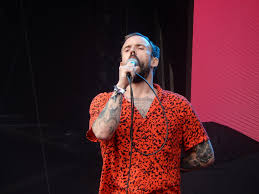
Idles frontman Joe Talbot has always balked at descriptions of his band’s music as “angry.” “The anger was what I realized was putting me in very bad places,” he confessed. Instead, he claimed, his music seeks to be an avenue out of anger and towards a more reconciled life. Yet, it would be easy to see why people could mistake Idles for the very things they attempt to combat.
The Bristol post-hardcore outfit’s music features loud, discordant guitars, urgent, driving tempos, and furious screaming in a thick Bristol accent. Talbot, however, prefers to think of the band’s aggression as a texture, a creative device; as he puts it, “a guitar sound.” In reality, he said, his violent, aggressive delivery doesn’t seek to insulate himself from vulnerability, but rather, pushes his own vulnerability to the forefront. After all, it probably takes more courage and vulnerability, not less, to scream the words “I love you” at an audience, as Talbot does on the 2019 track “Love Song,” than it does to croon them. In fact, at the center of all of Idles’ music, no matter how bellicose its trappings, has always been a kind of radical compassion, a stream of sincerity and genuine goodwill running throughout all of the clash and cacophony. Even at the band’s most haphazard moments, Idles’ music carries with it an unlikely depth and nuance, exploring themes of mental health, love, and compassion, and railing against homophobia, toxic masculinity, and racism.
On TANGK, the band’s newest album, which was released on February 16th, these themes of love move even further to the forefront.
Employing the talents of Radiohead producer Nile Godrich and famed hip-hop producer Kenny Beats, the band continues to expand on its raucous punk and hardcore roots, bringing in influences from hip-hop, electronica, and industrial music, to make for a slower, more deliberate soundscape, that reflects Talbot’s lyrics’ pensive new subject matter. While the band’s traditional punk-ish bops still abound, in the form of tracks such as “Gift Horse” and “Dancer,” the influence of its eclectic duo of producers makes its way through for quieter moments, such as on the track “Gratitude,” a brooding industrial reverie, over which Talbot spits the hypnotic mantra, “No god, no king, I said love is the thing.” Even on the faster, more intense tracks, however, this new emotional and musical nuance shines through. The vocals are often more melodic, if not, at least more sparse and considered, and the instrumentation more varied. This can be heard on the track “Dancer,” a driving post-hardcore anthem, embellished with Bond-movie-esque guitars, that extolls the virtues of losing it on the dance floor. This disparate mix persists throughout the album, in which outright joy, aggression, and tenderness exist in quick succession and often within the same song. It’s this juxtaposition—of aggression and tenderness, of vulnerability with violence—that lends Idles’ music its unique power.
The band challenges hate and toxicity precisely by appropriating all of its tropes and tools. Idles show that peace, passion, and love, aren’t something that has to be frail. They can be powerful, loud, and even obnoxious, just as they can be beautiful and nuanced. The band’s brand of compassion is one that you can feel in your gut, that you can mosh to, that you can scream your lungs out to, making it the perfect antidote to hate in an angry world.












































































































































